Chinese restaurants
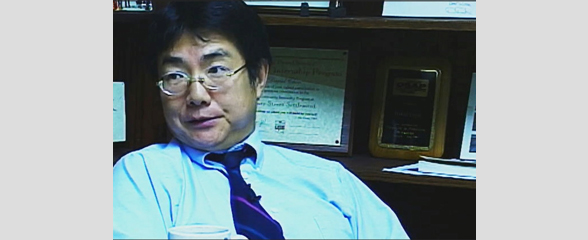
2014.036.015 Oral History Interview with David Chen July 13, 2004
In this interview, David Chen discusses his work at Chinese-American Planning Council (CPC) as an activist in New York City Chinatown. Chen is the director of CPC, a private organization started in 1965 serving the public and focusing on low-income immigrant families, mostly Chinese. Services offered include language classes, translations, daycare centers, job training for adults, senior citizen care, childcare, and Meals on Wheels. Prior to his work at CPC, Chen worked for the mayor in Chicago. While there, he constantly questioned why there was no Chinese funding. While in college, Chen studied to be a social worker and community organizer. He explains that he was not good at chemistry and did not want to pursue medicine or law like his parents expected him to. During college, he and his friends volunteered in Chicago Chinatown, which is much smaller than New York City. In Chicago Chinatown, Chen and his friends taught English classes but there were not many job opportunities in the community, so he decided to work for the government. On a visit to New York City, Chen fell in love with how densely populated and large Chinatown was and was told that there were many job opportunities available. He applied for a position at CPC as a youth director twenty-three years ago, accepted the role, and moved to New York City. Chen was part of "Project Reach", which was an at-risk prevention program for troubled kids. He describes Chinatown as a transient neighborhood in that there is constantly an influx of Chinese immigrants every few years. CPC serves those immigrants by helping them get entry-level jobs and helping them get their foot in the door. By doing so, he hopes that secure immigrants who have gotten aid from CPC would be able to help the next wave. Asked about his upbringing, Chen shares that he is from an upper-middle class family and that his father was an engineer. He was originally born in Shanghai but his family moved to Hong Kong while he was a baby. He came alone to the United States during his final year of high school and focused on school in order to avoid being drafted into the Vietnam War. The last part of the interview briefly covers 9/11. Chen notes that in the recovery and aftermath, Chinatown was largely ignored although it was an adjacent neighborhood to the World Trade Center. Chen also describes how important Chinatown is to tourism because of its restaurants and shopping venues.

2014.036.015 Oral History Interview with David Chen July 13, 2004
In this interview, David Chen discusses his work at Chinese-American Planning Council (CPC) as an activist in New York City Chinatown. Chen is the director of CPC, a private organization started in 1965 serving the public and focusing on low-income immigrant families, mostly Chinese. Services offered include language classes, translations, daycare centers, job training for adults, senior citizen care, childcare, and Meals on Wheels. Prior to his work at CPC, Chen worked for the mayor in Chicago. While there, he constantly questioned why there was no Chinese funding. While in college, Chen studied to be a social worker and community organizer. He explains that he was not good at chemistry and did not want to pursue medicine or law like his parents expected him to. During college, he and his friends volunteered in Chicago Chinatown, which is much smaller than New York City. In Chicago Chinatown, Chen and his friends taught English classes but there were not many job opportunities in the community, so he decided to work for the government. On a visit to New York City, Chen fell in love with how densely populated and large Chinatown was and was told that there were many job opportunities available. He applied for a position at CPC as a youth director twenty-three years ago, accepted the role, and moved to New York City. Chen was part of "Project Reach", which was an at-risk prevention program for troubled kids. He describes Chinatown as a transient neighborhood in that there is constantly an influx of Chinese immigrants every few years. CPC serves those immigrants by helping them get entry-level jobs and helping them get their foot in the door. By doing so, he hopes that secure immigrants who have gotten aid from CPC would be able to help the next wave. Asked about his upbringing, Chen shares that he is from an upper-middle class family and that his father was an engineer. He was originally born in Shanghai but his family moved to Hong Kong while he was a baby. He came alone to the United States during his final year of high school and focused on school in order to avoid being drafted into the Vietnam War. The last part of the interview briefly covers 9/11. Chen notes that in the recovery and aftermath, Chinatown was largely ignored although it was an adjacent neighborhood to the World Trade Center. Chen also describes how important Chinatown is to tourism because of its restaurants and shopping venues.
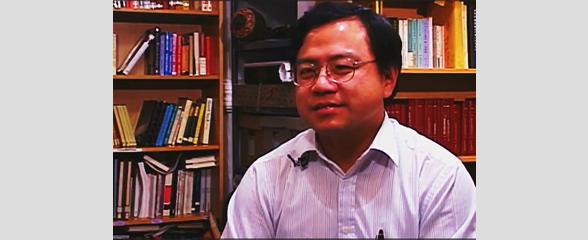
2014.036.016 Oral History Interview with Wing Ma November 7, 2003
Wing Ma (Ma Wing Guo) was born in China to a poor farming family who moved to Hong Kong as refugees when he was age two. Wing talks about his life growing up in Hong Kong with his mother working in the garment industry and his father working as a chef in Manila. He studied until post-secondary school before moving to the United States to train and work as an engineer. Wing would eventually join the garment industry as a factory owner, and describes the industry decline over time due to overseas competition. This would also lead to his own factory closure. He details workers pay, union benefits such as healthcare, and his involvement with union negotiations as a member and president of the Garment Manufacturers Association. Wing also talks about his involvement with other community organizations following his transition into the liquor industry, such as the Asian American Advisory Council under Peter Vallone and Community Board Three. He shares his experiences acting as a liaison between the government and the local community and shares some of the positive changes this brought to Chinatown. During the September 11th, 2001 attacks, he recalls being shocked and upset that he was unable to reach friends and loved ones. He talks about the effects of the attacks on Chinatown through his personal experiences as a building landlord. He recalls the mass exodus of tenants from the area and the difficulty in obtaining support from relief funds for the Chinatown community. He discusses the need for the government to subsidize and support businesses returning to the area to improve the local economy. He also encourages the Chinatown community to become more active and participate in local government or social work. He concludes with a discussion of his thoughts on the future of the garment industry and alternative job prospects for Chinatown residents.

2014.036.016 Oral History Interview with Wing Ma November 7, 2003
Wing Ma (Ma Wing Guo) was born in China to a poor farming family who moved to Hong Kong as refugees when he was age two. Wing talks about his life growing up in Hong Kong with his mother working in the garment industry and his father working as a chef in Manila. He studied until post-secondary school before moving to the United States to train and work as an engineer. Wing would eventually join the garment industry as a factory owner, and describes the industry decline over time due to overseas competition. This would also lead to his own factory closure. He details workers pay, union benefits such as healthcare, and his involvement with union negotiations as a member and president of the Garment Manufacturers Association. Wing also talks about his involvement with other community organizations following his transition into the liquor industry, such as the Asian American Advisory Council under Peter Vallone and Community Board Three. He shares his experiences acting as a liaison between the government and the local community and shares some of the positive changes this brought to Chinatown. During the September 11th, 2001 attacks, he recalls being shocked and upset that he was unable to reach friends and loved ones. He talks about the effects of the attacks on Chinatown through his personal experiences as a building landlord. He recalls the mass exodus of tenants from the area and the difficulty in obtaining support from relief funds for the Chinatown community. He discusses the need for the government to subsidize and support businesses returning to the area to improve the local economy. He also encourages the Chinatown community to become more active and participate in local government or social work. He concludes with a discussion of his thoughts on the future of the garment industry and alternative job prospects for Chinatown residents.

2016.037.007 Oral History Interview with Philip Chiang 2015/12/15
Philip Chiang was born in Shanghai, China in 1948. Within a year, his family moved to Tokyo, Japan to avoid Chinas communist regime. He lived in Japan until the age of 14. He valued Japanese culture and the emphasis on hospitality. In 1962, he moved to San Francisco. His family lived there before it became the known, multicultural city it is today. His family ate out frequently, and it gave him the opportunity to enjoy many different cuisines. He grew especially fond of Italian food. Cecilia Chiang, his mother, opened a Chinese restaurant called the Mandarin Restaurant. The Mandarin became known in San Francisco as a high-end Chinese restaurant; it served the stars of Hollywood. Though Chinese cuisine was not new in San Francisco, the Mandarin popularized a refined northern Chinese cuisine. Philip Chiang helped at the family restaurant but did not get interested in the business until he was married. He worked in design and wanted to make more money. Thus, in 1984, he opened the Mandarette. Compared to the Mandarin, Chiangs alternative was cheaper. His clientele was younger and more progressive; it suited the urban and artistic landscape. At the Mandarette, he met Paul Fleming. Fleming continued to support the Chiang familys businesses even when the Mandarette closed. Fleming asked Chiang to help him open a Chinese restaurant in Arizona. In 1982, the now chain restaurant, P.F. Changs, opened its first location in Scottsdale, Arizona. Throughout the years, Chiang maintains one value: food should be simple. He emphasizes recipes that have no more than three ingredients.

2016.037.019 Oral History Interview with Wilson Tang 2015/10/30
Wilson Tang is a second-generation Chinese American restaurateur who was born in 1978 and grew up in Queens, New York. Before Tang was born, his parents decided to move out of Manhattans Chinatown to Queens to have a better family environment. Tang later found his way back to Chinatown when he attended college at nearby Pace University. After college, he went into a finance career, a path his parents strongly encouraged him to pursue. Tang quickly realized that the rat race of the traditional 9-5 job did not hold much appeal for him, and he began to consider entering the restaurant industry as his parents had done when they first immigrated during the early 1970s. Tangs first venture was a bakery opened in a building his father owned on Allen street. The bakery successfully ran from 2004 to 2007; however, success came at a steep price for Tangs personal health and well-being. Tang returned to the finance world in 2007 in order to regain control of his lifestyle and life-work balance. It was during this break from the restaurant world that Tang met his future wife and got engaged. In 2011 the opportunity to take over his uncle’s dim sum restaurant Nam Wah arose. More convinced than ever that the career of restauranteering was his true calling and despite the stress of his previous experience, Tang and his fiance decided to make the leap. The couple did some light renovations and refreshed the menu before opening, attempting to breathe new life into Nam Wah while preserving its historic atmosphere. As Nom Wah was renovated, Tang decided to create a Facebook page to document the long history of the tea parlor. The business received positive coverage from both the Daily News and the New York Times. As a result of this media coverage, business flourished and Nom Wah became a staple of Chinatown. Tang is grateful for the success he has experienced, but notes that the restaurant industry is still an incredibly demanding field. He hopes to use his success as a platform to elevate and support other Chinese American entrepreneurs and Chinatown businesses in NYC.
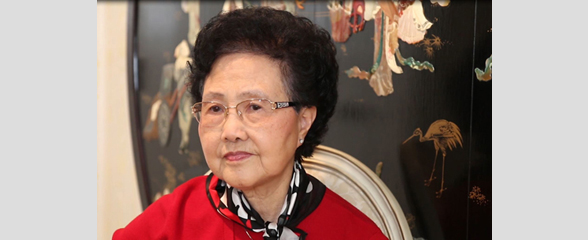
2016.037.021 Oral History Interview with Kimmie Lee Tie
Kimmie Lee Tie discusses her early life in China and how World War II impacted her family and interestingly her diet. She talks about the experiences she had cooking on her familys small farm and how after the war she married a Chinese American sailor and moved to the United States. Living in the US, Kimmie and her husband bought a Cantonese restaurant in 1957 which they operated for twenty years. In this environment, she taught herself how to cook with a wok and developed her Chinese American tastes. Make sure to listen in for her personal recipes, especially her favorite butterfly shrimp.
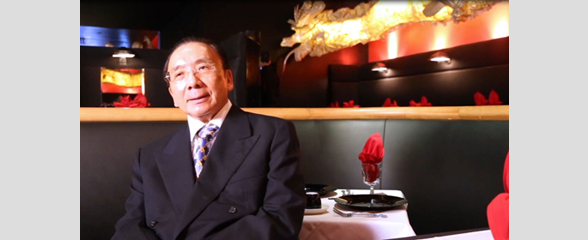
2016.037.022 Oral History Interview with Michael Tong 2016/03/11
Michael Tong describes his path from his birth of Anhui to becoming one of the most successful restaurateurs in New York City with two four-star restaurants. Moving first to Shanghai and Hong Kong before settling in the US, Mr. Tong studied civil engineering but chose to work in a NYC restaurant after graduation. From there, he opened up two restaurants, Shun Lee Palace and Shun Lee West, where he developed his love for different Chinese cuisines and helped bring Sichuan and Hunanese food to New York and the US. Tune in to hear his thoughts on what makes certain Chinese food authentic and his view of how Chinese food and American tastes have changed since the 1970s.
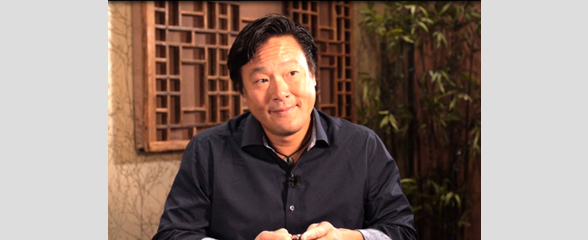
2016.037.023 Oral History Interview with Ming Tsai 2015/10/19
Ming Tsai talks with MOCA about his lifelong relationship with food and how he came to be one of the most successful East-West fusion chefs. Listen in as Ming explains the role that food and cooking played in his early life growing up around his grandparents in a Chinese-American household and visiting Taiwan. Despite going to Yale for a degree in engineering, he ultimately decided to become a chef, and after working in several famous French kitchens and culinary schools, he pursued a hospitality degree at Cornell which launched him into hotel management. He eventually followed his dream of becoming a chef-owner at his own restaurant, Blue Ginger. Throughout the discussion, Ming weaves in beautiful anecdotes about food and his philosophy of how to blend cuisines successfully. He concludes his discussion with his thoughts on the importance of charity in his life and his experience using food for diplomacy.
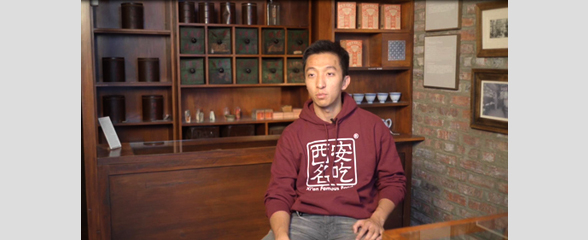
2016.037.024 Oral History Interview with Jason Wang 2015/10/23
Jason Wang was born in XiAn, China and moved to the U.S. when he was eight years old. Wang and his family lived in various suburban communities during his childhood while his father worked at different Chinese restaurants. Wang’s father eventually opened a bubble tea franchise that later evolved into their successful XiAn Famous Foods restaurant. After spending college breaks helping his father at the bubble tea shop and feeling ungratified by his post-graduation corporate job, Wang decided to begin his career as a restauranteur with his father. Wang helped his father update XiAn Famous Foods by translating its menu into English and creating a website for the business. The original Flushing, Queens location developed a solid fanbase and saw even greater success after Anthony Bourdain mentioned the eatery on his hit television show No Reservations in 2008. Since then, XiAn Famous Foods has expanded to over ten locations across New York City five boroughs. Wang is proud to have pioneered the previously unknown street cuisine of his hometown in America. He hopes that their “fast-casual†restaurant model will enable them to expand to other regions in the U.S. and introduce an increasingly adventurous American public to Xian classics like their iconic liang pi “cold-skin noodles.â€